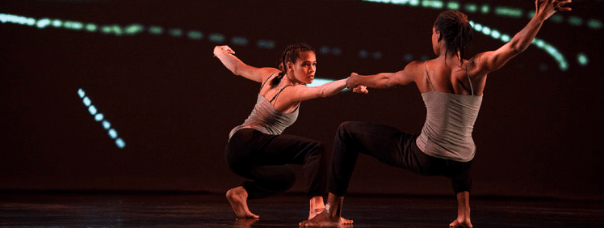Feb. 15 to 17, the dance department presents Cardinal Points at the Sandra Faire and Ivan Fecan Theatre. The performance will feature the York Dance Ensemble and guests, with choreography by faculty members, PhD candidates, and fourth-year dance BFA students.
Tracey Norman, dance department professor and choreographer of chorus of anguish, says that it “is a dance for this particular group of young people who share many of the same concerns for the world as do I – both articulated and lacking articulation, tangible and seemingly distant. There’s a flavour of living right now that seems to separate the personal or individual from the collective/the community as if our needs are radically different from each other. Despite advancing technology and what sometimes feels like a declining ability to communicate, we desperately need each other, and the only real reparations and changes have been made through collective effort.
“I’m always interested in effort, exhaustion, raw emotion, and how to craft those elements enough to develop a container for the work but not so much that we lose touch with the edge of chaos,” adds Norman.
Cardinal Points can be described as not only being a collaborative performance between faculty, staff and guests, but an important culmination of the diversity of dance artists found at York and in Toronto.
Patrick Alcedo, co-choreographer of Banga/Salidsid with Julius Calum, and dance department chair and professor, explains their piece, Banga/Salidsid, as “an Indigenous dance from the Kalinga community of the Cordillera Mountain Range in the northern Philippines. It is about a group of maidens rooting for a female dancer who shows prowess by balancing stacks of pots on her head. As she balances these earthen jars, her suitor engages her in a dance that depicts the movements of a hen and rooster.”
Fourth-year dance student, Rayn Cook-Thomas, whose traditional name is Gwagwadaxla from his community in the Kwakwaka’wakw nation, has created a piece about the endangered Southern Resident Orcas surrounding Vancouver Island.
“For me and my nation, orcas are important spiritual leaders — they carry ancestral knowledge and are highly respected across the coast. I wanted to emphasize the sheer strength, beauty, and spirituality of orcas in their complex societies, while also facing the realities of human impacts, and the long-lasting detrimental effects on the earth caused firstly by colonialism,” says Gwagwadaxla.
They explain they called the dance Ancestor 74 because at the time, there were 74 Southern Resident Orcas. “In the short time since we’ve come back to the work, it was announced by the Center for Whale Research that there are now 73,” Gwagwadaxla, says. “This is a poignant reminder of how urgent these issues are, how important it is to spread these conversations to places like Toronto, and it has definitely fuelled the work and brought it in a new direction.”
Norman also explains her inspiration for the show and how the COVID-19 pandemic has affected that vision.
“On the heels of the pandemic, I’ve been feeling incredibly rusty and confused about what I do as a dancemaker. This process provided me a burst of knowing and newness,” says Norman. “I think it’s been evident to the group when I need time to think, when I don’t know and when something isn’t working. The practice of being okay with this in front of others is always uncomfortable but allows us to trust more deeply. I’ve felt held by the group and there have been a lot of laughs along the way.”
To get tickets to see Cardinal points or to learn more about the show, click here.



